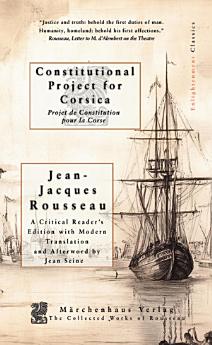Constitutional Project for Corsica
About this ebook
Commissioned by Corsican leader Pasquale Paoli, the project reflects Rousseau’s belief that a small, relatively undeveloped and rural society such as Corsica could serve as the ideal foundation for a just and stable republic. He emphasized the importance of cultivating civic virtue, simplicity, and patriotic sentiment through institutions that promoted collective identity over individual interest. Rousseau proposed a decentralized, agrarian economy and a robust educational system to instill public morality and attachment to the general will. He envisioned laws emerging from the people themselves, channeled through a sovereign assembly, and strictly oriented toward the preservation of equality and liberty. The constitution would ensure that no part of society grew too powerful or distant from the common good.
Rousseau's plan was deeply influenced by his fear of moral corruption in large, commercialized states. He argued that Corsica, still largely free from the corrupting luxuries of urban civilization, had a unique opportunity to develop a virtuous and sustainable republic grounded in nature, tradition, and frugality. The constitution sought to prevent the rise of factions and economic inequality by limiting wealth accumulation and promoting a rural lifestyle. Military service, religious observance, and communal festivals were all encouraged as means of reinforcing solidarity and discipline. Rousseau’s Corsica was to be a deliberately shaped polity, in which lawgiver and citizen coexisted within a framework designed to resist the centrifugal forces of modernity. Although never implemented, the project stands as a rare instance of Enlightenment political theory tailored to a real-world revolutionary context and offers a revealing portrait of Rousseau’s ideal republic in practice.
This modern critical reader's translation from the original French manuscripts includes supplementary materials that bring Rousseau's world and impact to life. This professional translation delivers scholarly depth with amplifying materials. This Reader's Edition includes an illuminating afterword tracing Rousseau's intellectual relationship with Diderot, Voltaire and his reception by Nietzsche, revealing the fascinating dialogue between the period's most influential minds. A comprehensive timeline connects the major events of Rousseau's life with world events, an glossary of Enlightenment terminology frames Rousseau's debates in the intellectual milieu of his day, and a detailed index provides an authoritative guide to his complete writings.











